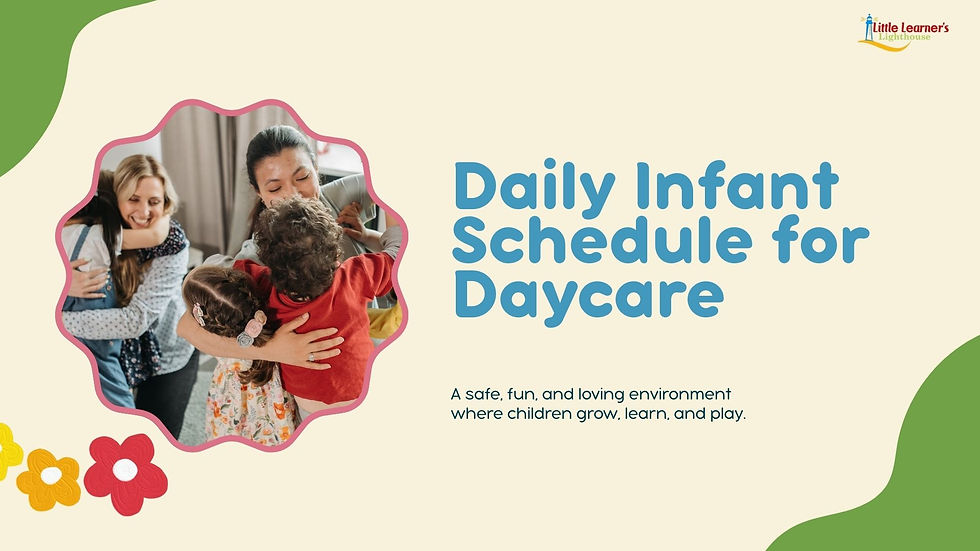Daily Infant Schedule for Daycare Made Simple
- alina4661
- Aug 14, 2025
- 4 min read

At Little Learner's Lighthouse, the early years of a child's life are learning, development, and growth. Children, and especially infants, benefit from a structured daycare schedule. As most parents wonder and worry about how their child's day is structured, we ensure infants receive the care and stimulation they require through a flexible structure.
One of the fundamental principles at Little Learners Lighthouse is that nurturing rest and rhythm is integrated into the daycare schedule for infants. Each infant's day with us includes feeding, nurturing, rest, and rhythm. Along with fostering cognitive development, optimal physical health, and emotional security, nurturing rest and rhythm also helps to ensure balanced, holistic development.
For more information Click Here
Why is a Daycare Infant Schedule Important?
To some, an infant daycare schedule may seem like a monotonous routine of feeding, sleeping, and monitoring bottle intakes. Emphasis is placed on emotional health; infants are trained to build a foundation for healthy habits and emotional stability.
Children flourish in a predictable environment. Mastery of what comes next not only reduces stress and anxiety but also surprisingly enhances brain development.
Little Learner's Lighthouse exemplifies how crucial it is to maintain a structured schedule for infants at daycare centers. It explains how infants can adapt to the daycare schedule, eat nutritious meals, sleep, and participate in activities effortlessly. Additionally, trust is reduced between the caregiver and the parent, which in turn strengthens the attachment. The outlined schedule appeals to the parents.
For more information Click Here
Key Areas Of Development For Infant Daycare
Your daycare infant schedule consists of six areas, each with clearly defined objectives catered to children below the age of twelve months.
Arrival and Warm Welcome: The first contact with babies involves a warm and smiling greeting, which helps ease the transition.
Feeding Times: Each baby's intake of breast milk or formula, as well as early solids, is evaluated to ensure age-appropriate and timely feeding.
Naptime: Safe sleep guidelines are adhered to for the provision of a safe sleep space free from ongoing disturbances. Regular rest is critical for growth.
Play and Exploration: The center cares for children below 12 months and helps babies develop curiosity and motor skills by providing suitable toys and sensory activities as outlined in the infant schedule.
Outdoor Time: For infants, gentle and low-intensity activities outdoors are offered as weather permits.
Cuddles and Comfort: As vital as physical needs are, emotional needs are equally important. Hence, carrying, swaying, and quieting are integrated into the daily routine.
For more information Click Here
Morning Tasks in the Daycare Routine for Infants
The reception of the infant is both calm and dynamic. Infants are to receive their feeding gently and within the same period. After this, there is short, colorful toy or sensory mat play. There is a balance of activity and rest for all the infants on the schedule, aligned to their routines. It should be noted that the morning naps are streamlined, too.
For more information Click Here
Afternoon Tasks in the Daycare Routine for Infants
The second feeding of the day is almost always followed by gentle music, storytime, or tummy time. To promote enthusiasm and engagement, there is no allowance for over-tiredness in the infant daycare schedule. Older infants are taken out for stroller walks in the late afternoon, provided the weather is favorable.
For more information Click Here
Daycare Routine for Infants Evening Wrap-Up
The daycare schedule is highlighted by parent and caregiver discussions during the pick-up time. During this period, caregivers give a detailed account of the infant's feeding, sleeping, and playtime activities, outlining the developmental milestones for each infant.
This balance in reporting strengthens the habits encouraged at home, thus supporting a blended approach between home and daycare.
For more information Click Here
Concerns About Daycare Scheduling Flexibility For Infants
This is a challenging area for numerous individuals. At Little Learner's Lighthouse, we strive to achieve a balance between structure and flexibility. Our staff will try to work with the schedule, for example, during an infant's developmental phases like growth spurts, teething, or shifting sleep patterns.
For more information Click Here
What Are The Infant Schedule Learning Objectives And Teaching Techniques?
The motor and sensory skills, as well as the language of the toddlers, are the daycare's aim for the infant schedule. This incorporates music and tummy time. All routines and activities are designed to utilize the available teaching and learning opportunities.
For more information Click Here
Advantages of Having a Schedule for Infants in Daycare
Enhanced Sleep: Infants achieve deeper levels of rest with consistent nap periods.
Healthier Eating: Fixed meal times decrease fussiness while improving digestion.
Easier Home Transitions: Weekends and evenings become simpler for parents to segue into following the daycare schedule.
Emotional Stability: Stability offers confidence and a sense of safety to children.
Schedules provide a child's first exposure to being grounded in an experience that fosters lifelong learning.
For more information Click Here
Conclusion
At Little Learner's Lighthouse, we construct infant daycare schedules to foster growth and joy in a child's life. A blend of structure and flexibility serves each infant's needs and reassures parents. Our routines support caregivers in offering infant daycare, therefore, allowing them to tend to the whole child—mind, body, and heart.
FAQs
What is an infant's schedule for daycare?
An infant schedule is a breakdown of a routine for feeding, naps, and age-appropriate activities tailored to a daycare setting.
Why is an infant's schedule for daycare important?
An infant schedule creates consistency, which aids in fostering a sense of security while developing healthy habits.
Does the timetable for an infant daycare center include playtime activities?
Yes, children are given appropriate play activities and physical interaction during the session.
Can parents change the daycare timetable for infants?
Yes, the timetable is prepared based on the requirements of every child so that it can be tailored.
How do parents receive the timetable for their infant's daycare?
Through scheduled conversations and reports that are given to parents at fetch time.




Comments